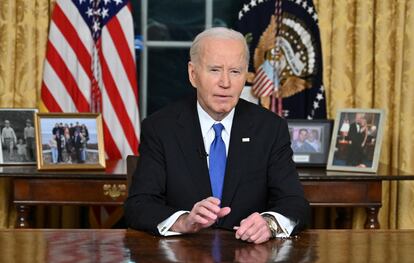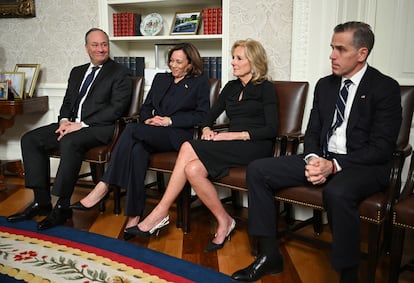Biden warns against tech ‘oligarchy’ and abuse of power in farewell speech
The president defends his legacy while warning about the ‘tech-industrial complex,’ with veiled references to Donald Trump, Elon Musk and Mark Zuckerberg

Four days before leaving the White House, Joe Biden is already on his way out. On Wednesday the president addressed the nation in prime time to deliver his farewell speech, a tradition that dates back to the first president, George Washington, in 1796, and which has become institutionalized in recent decades. From the Oval Office, with family photos behind him, Biden defended his legacy before the American people and before history, but he also went on the attack. He warned against the technological “oligarchy” emerging in the country and attacked social media platforms that have given up on fact-checking, an obvious reference to tycoons such as Elon Musk and Mark Zuckerberg, who have allied themselves with Trumpism. Biden also defended the institutions, warned against “abuse of power,” and maintained that presidents should not have immunity for their actions, alluding to his successor, Donald Trump.
“I want to warn the country of some things that give me great concern. And that’s the dangerous concentration of power in the hands of a very few ultrawealthy people, and the dangerous consequences if their abuse of power is left unchecked. Today, an oligarchy is taking shape in America of extreme wealth, power and influence that literally threatens our entire democracy, our basic rights and freedoms and a fair shot for everyone to get ahead,” Biden said. Trump is a billionaire, and one of his top allies is Elon Musk, the wealthiest man in the world. The members of the incoming administration collectively accumulate more wealth than any previous Cabinet.
The president drew a parallel with the military-industrial complex that Dwight D. Eisenhower once warned about. “President Eisenhower spoke of the dangers of the military-industrial complex. He warned us about, and I quote, ‘The potential for the disastrous rise of misplaced power.’ Six decades later, I’m equally concerned about the potential rise of a tech-industrial complex that could pose real dangers for our country as well.”
“Americans are being buried under an avalanche of misinformation and disinformation enabling the abuse of power. The free press is crumbling. Editors are disappearing. Social media is giving up on fact-checking. The truth is smothered by lies told for power and for profit,” he added.

In a 17-minute address that included several blunders and used the Statue of Liberty as a symbol, the 82-year-old Democrat who is now ending a half-century of political career defended the country’s institutions as well as his achievements ― which were overshadowed by high inflation, the rise of illegal immigration and international instability. These burdens have facilitated Trump’s return to the presidency in what is, in some ways, Biden’s greatest failure.
Biden initially saw himself as a transitional president called to end the Trump era. Then, encouraged by some of his achievements and the good results of the 2022 midterm elections, he thought he had the strength to win a second term against Trump despite his age. To this day, Biden continues to feel that he could have defeated Trump again, but his disastrous performance in the June debate and the subsequent pressures from his own party led him to make way for Kamala Harris. Trump’s victory at the polls now leaves Biden’s presidency as a hiatus between the Republican’s two terms.
His time in the White House is ending with a similar feeling to that of Jimmy Carter, who recently passed away. Price increases and the Iran hostage crisis led to the latter’s defeat by Ronald Reagan and overshadowed his progress, which was later acknowledged. In Carter’s case, the release of the hostages from the Embassy in Tehran occurred just after Reagan was sworn in. Biden, at least, has been able to celebrate the agreement for a ceasefire in Gaza and dispute the merit with his successor, whose pressure seems to have been decisive and who has claimed the achievement as his own.
Like Carter, Biden leaves office as a one-term president. On one side of the scale he has the pandemic recovery, strong job creation, infrastructure plans, investments in chip plants and other industries, the extension of welfare coverage, incentives for green energy, environmental protections and drug price cuts. In addition, he has rebuilt the network of U.S. foreign alliances, strengthened NATO and turned the U.S. into a country without any soldiers at war after ending the longest armed conflict in Afghanistan in two decades.
The withdrawal from Afghanistan in 2021, however, was chaotic, leaving 13 soldiers dead in a suicide bombing at Kabul airport, killing 180 people. It was the prelude to new foreign policy problems, first with the Russian invasion of Ukraine, then with the Hamas attack on Israel and the Gaza war. The multi-billion-dollar aid to Ukraine and the unwavering support for Israel eroded the president’s popularity among different groups of voters.
Along with geopolitical instability, the two big drags on Biden’s presidency have been rising prices and immigration. Inflation reached its highest level in four decades due to supply chain bottlenecks in the pandemic recovery and the boom in energy and raw material prices, partly driven by the war in Ukraine and instability in the Middle East. It was a global phenomenon, but citizens felt the effects directly at the grocery store and at the gas pump. Although the strength of the American economy has been the envy of the world, discontent and frustration took hold among Americans.
Meanwhile, immigrant arrivals broke records during his term. Trump and the Republicans characterized the phenomenon as an “invasion” and took advantage of the problems caused by the influx ― in particular, a few isolated but very high-profile crimes ― to articulate a xenophobic discourse, sometimes full of lies, that was very effective among voters. Only in the last part of his term did Biden take measures to curb irregular crossings.
Biden will officially leave his position on January 20. His last words from the Oval Office were an emotional appeal to Americans: “After 50 years of public service, I give you my word, I still believe in the idea for which this nation stands — a nation where the strength of our institutions and the character of our people matter and must endure. Now it’s your turn to stand guard. May you all be the keeper of the flame. May you keep the faith. I love America. You love it, too. God bless you all, and may God protect our troops. Thank you for this great honor.”
Sign up for our weekly newsletter to get more English-language news coverage from EL PAÍS USA Edition
Tu suscripción se está usando en otro dispositivo
¿Quieres añadir otro usuario a tu suscripción?
Si continúas leyendo en este dispositivo, no se podrá leer en el otro.
FlechaTu suscripción se está usando en otro dispositivo y solo puedes acceder a EL PAÍS desde un dispositivo a la vez.
Si quieres compartir tu cuenta, cambia tu suscripción a la modalidad Premium, así podrás añadir otro usuario. Cada uno accederá con su propia cuenta de email, lo que os permitirá personalizar vuestra experiencia en EL PAÍS.
¿Tienes una suscripción de empresa? Accede aquí para contratar más cuentas.
En el caso de no saber quién está usando tu cuenta, te recomendamos cambiar tu contraseña aquí.
Si decides continuar compartiendo tu cuenta, este mensaje se mostrará en tu dispositivo y en el de la otra persona que está usando tu cuenta de forma indefinida, afectando a tu experiencia de lectura. Puedes consultar aquí los términos y condiciones de la suscripción digital.









































